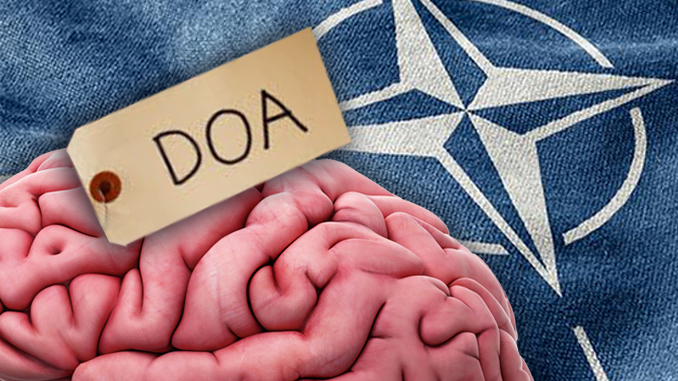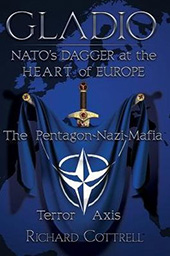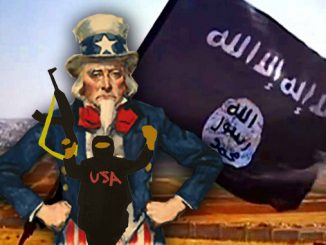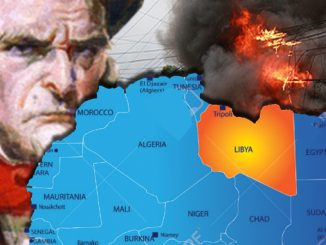
The divides between NATO member states is growing larger.
By Richard Walker
After 70 years, the North Atlantic Treaty Organization (NATO) has gone into steady decline. While its supporters, to quote Mark Twain, will insist that its death has been greatly exaggerated, the cracks in its core have been growing deeper.
French President Emmanuel Macron, the most outspoken European leader on the issue, is now claiming that NATO is brain dead due to dwindling support from Washington.
His views appear to echo a previous remark by President Donald Trump that NATO was obsolete, but that did not entirely reflect the president’s opinion, because he also said that the alliance was “very important” to him. The conflicting nature of all these assertions has only added to a general feeling that NATO is no longer as relevant as it once was. According to Macron, it could soon vanish.
There is no disputing that it has departed from its original mission to protect Europe from the Soviet Union. The disintegration of the Soviet empire, and the growing closeness of Washington and Moscow, has led many observers to conclude that since Russia no longer poses an imminent threat of the kind once clearly apparent in Soviet political and military posturing, NATO is indeed a relic of the past.
A rarely discussed aspect of the debate about the fast-changing nature of NATO is the failure of many of its backers to recognize that its demise accelerated under the Barack Obama presidency. That might seem contradictory, given President Obama’s praise of the alliance and his dependence on it, but the fact remains that he exploited NATO’s military capability and expanded its reach well beyond Europe, much to the organization’s detriment. He also allowed Israel to engage with NATO exercises and toyed with the prospect of backing an Israeli request for membership.
The starkest examples of how he damaged the NATO brand can be found in his willingness to enable French President Nicholas Sarkozy and British Prime Minister David Cameron to push for the overthrow of Libyan leader Col. Muammar Qaddafi. It has since transpired that Sarkozy had corrupt links to Qaddafi and may have wanted to get rid of him to hide financial ties to him. France also wanted Libya’s oil. Obama later blamed his two allies for the war in Libya and the mess that has followed, but that was disingenuous. After all, Obama was in overall charge of the NATO forces that overthrew the Libyan government.
Libya was not the end of NATO’s foreign adventurism. Obama dragged the alliance into the war in Syria, once again with the French and British, as well as NATO member Turkey. Help in the shadows came from Israel and Saudi Arabia. NATO helped train and arm the terrorist and guerrilla forces amassed to fight Syria’s government led by Bashar al-Assad, including Kurds and extreme Islamic elements such as the al-Nusra Front. It was heavily involved in the arming and training of the anti-Assad forces, routing large weapons consignments through the Balkans to northern Iraq where they were distributed to Kurdish fighters. It also quietly encouraged Turkey to train anti-Assad militias, many of them dominated by ISIS fighters.
A critical result of the wars in Libya and Syria was a massive flow of migrants into Europe. So, while NATO was an alliance designed to protect Europe from exterior threats, it chose instead to create conditions that facilitated a mass migrant movement that became a threat to Europe’s internal stability.
A real body blow to NATO cohesion arose from the 2016 failed coup against Turkey’s President Recep Erdogan, who said the attempt to dethrone him was approved by Obama and European NATO members, specifically Germany. Moscow exploited Erdogan’s subsequent anti-Western feelings and benefited from the fact that the Russians had also saved Erdogan’s presidency by giving him ample warning of the plot against him. Since then, however, Trump has developed closer ties to Moscow and Erdogan and has refused to oppose Turkey’s decision to purchase the Russian S400 missile system over its U.S.-NATO counterpart, the Patriot missile system.
By all accounts, Turkey no longer appears to be a committed NATO member, further shattering the alliance’s claim to unity. It has instead drawn closer to its neighbor, Russia.

A further sign of NATO weakness has been its reduced funding over decades, due to the unfair reliance of its members on Washington’s dollars. The effects of this were evident in 2018 during the NATO military exercises, Trident Juncture. They paled in comparison to massive exercises held by Russia, illustrating that NATO was no match for Russia in a conventional war. It was equally embarrassing for NATO that Russia managed to disrupt the NATO exercises by using electronic warfare devices to target them.
NATO now finds itself divided into blocs, with the most vocal being those nations like Poland bordering Russia who argue that the threat to Europe comes from the East. In contrast, Trump wants NATO to focus solely on terrorism and illegal immigration. Other NATO members, especially Germany and France, favor the creation of a European Defense Force to replace NATO, thereby signaling that they have already envisioned the death of the alliance. It is unlikely Britain would join any NATO replacement force.
What demonstrates that NATO is far from dead, however, is that there are more U.S. forces in Europe than there were during the Obama years, and Trump has committed to placing more troops in frontline Baltic states.
Richard Walker is the nom de plume of a former New York mainstream news producer who grew tired of seeing his articles censored by his bosses.







The 19th century British statesman Lord Palmerston said: “We have no eternal allies, and we have no perpetual enemies. Our interests are eternal and perpetual…”
Within a century the powers fought their first world war. A century on we look as though we are about to fight our third. Capitals should heed the warning of history.
https://www.ghostsofhistory.wordpress.com/